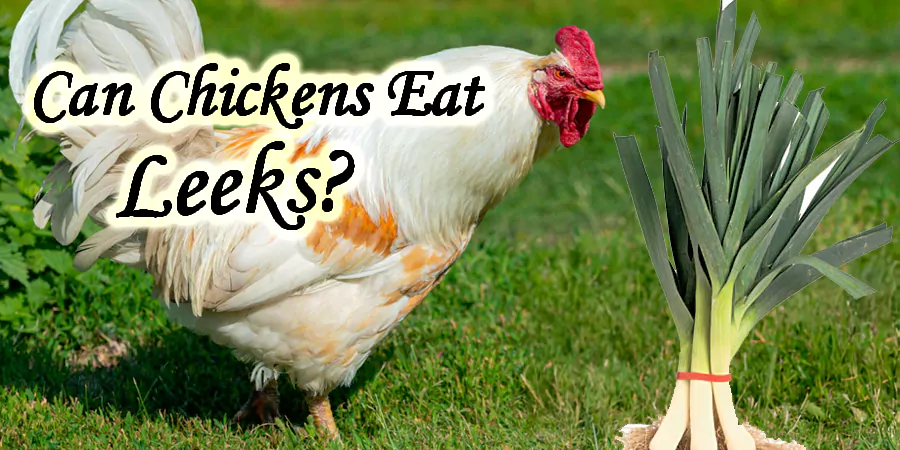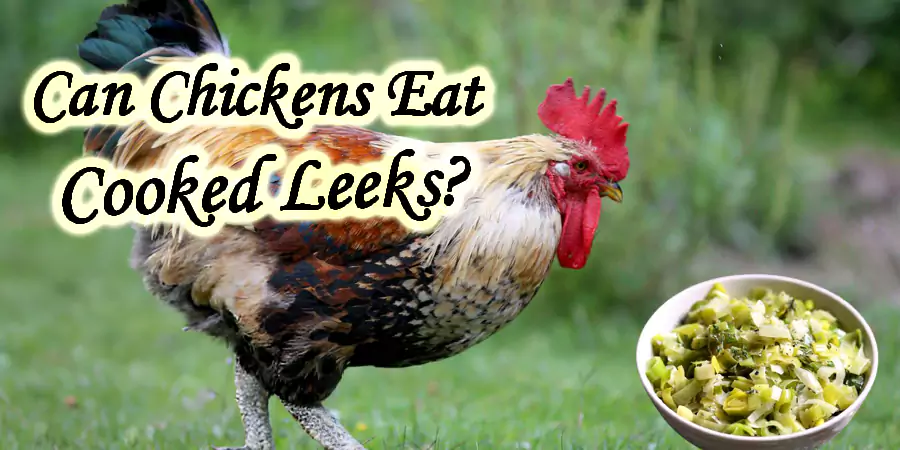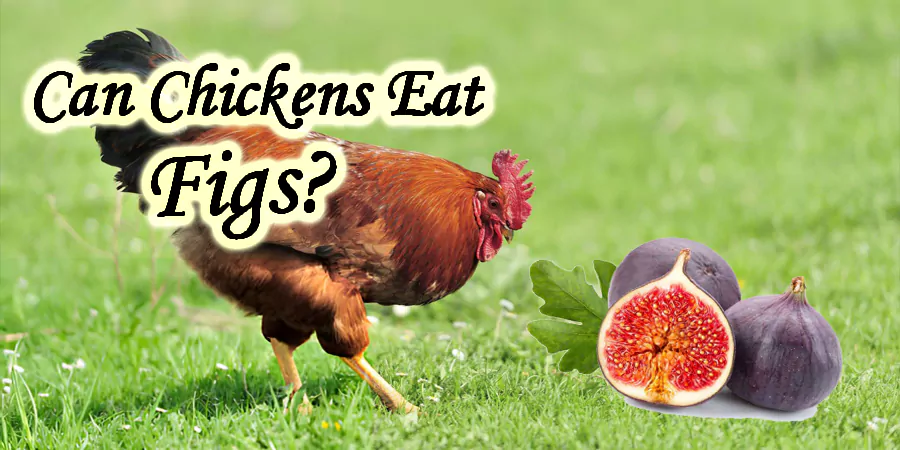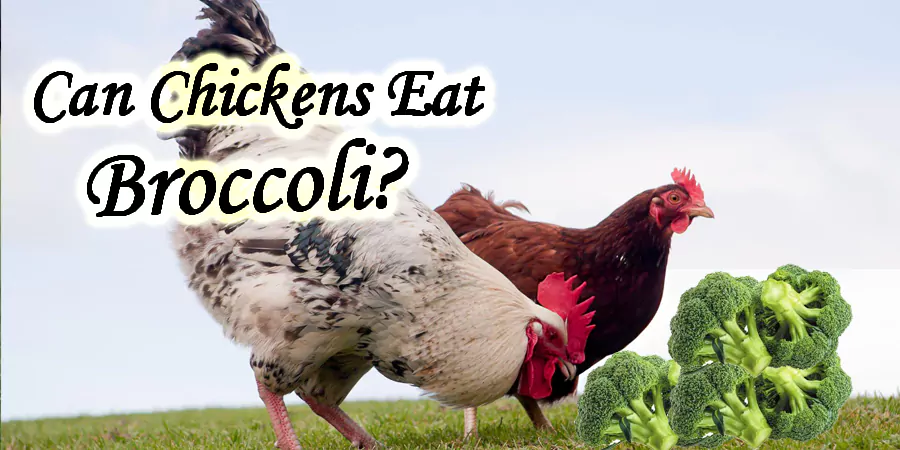Can Chickens Eat Leeks? Everything You Need To Know
Published: 20 Jul 2024
Yes, chickens can have leaks in moderation with some considerations. To ensure the safety of our flock, we must keep its portion under 5% of the total diet. A chicken keeper must be well-versed in the risks associated with Leeks. Careful observation and timely identification of its adverse effects are of prime importance.
We as chicken enthusiasts are curious to differentiate what chickens can and cannot eat. Can chickens eat leeks? This is one of the queries often raised by poultry keepers. Leeks are closely linked to onions and garlic. Therefore chicken enthusiasts are a bit nervous about its use for their flock. We will uncover the complete details about the nutritional value of Leeks.

Can Chickens Eat Leeks? Let’s Explore Now
What is a Leek?
A leek is a leafy green vegetable that belongs to the genus Allium family. Onions, garlic, and shallots are also members of this family. Leek has a tangy flavor like onion. It has dark green leaves with white stalks. It contains some nutrients for chickens.
Nutritional Value of Leeks
The nutritional value of any diet is of prime importance for optimal growth of chickens. Therefore we are analyzing the nutritional profile of Leeks to justify its use for chickens. Leek is a low-calorie and carbohydrate vegetable which is good for chickens. It contains fiber content which supports the digestive system of backyard friends. Leeks have proteins that are useful for performing physical activity.
Leeks are full of Vitamins A, C, and K. Vitamin A improves eyesight health. Vitamin C provides antioxidant support to protect cells from damage and strengthen the immune system in chickens. Vitamin K is helpful in blood clotting and improves bone health. Folate available in Leeks is good for cell division and DNA synthesis. Leeks are packed with minerals like potassium, magnesium, and calcium. These nutrients are useful for chickens in their overall growth and well-being.
Can Chickens Eat Leek Plant? What Parts are Edible?
The leek plant has various parts and each of them presents different benefits and risks for chickens. Therefore, we must understand all parts individually before serving them to our backyard chickens.
Can Chickens Eat White Leek Base?
Yes, chickens can have the base of leeks. The white base of leeks is a tender and delectable food for chickens. It contains a good amount of healthy nutrients for chickens. Leek base provides carbohydrates, fiber content, Vitamins (A, C, and K), and Minerals (potassium and magnesium).
Some simple steps ensure the safe digestion of leeks for chickens. The most important step is moderation. Serve Leek base as supplemental food for chickens. Properly decontaminate it with water to prevent digestive issues. Select fresh leeks and never serve spoiled or moldy leek bases to chickens. Attentive observation of reaction from the flock is very important.
Can Chickens Eat Light Green Leek Stalks?
Yes, chickens can enjoy light green leek stalks in moderation. Like leek bases, stalks are also a tender diet for chickens. Leek stalks have the same nutritional value as the white base of a leek. It is full of carbohydrates, minerals, vitamins, and fiber content. These nutrients support the growth of chickens.
Remember that light green leek stalks are only used as an occasional diet for chickens. Excessive use of leek stalks is not recommended for chickens. Select fresh leek stalks and remove dirt or pesticide residues with running water. Moldy or spoiled stalks are hazardous to our flock’s health. After proper preparation, serve it in moderation. Introduce gradually and monitor the response from the flock.
Can Chickens Eat Leek Leaves?
Yes, chickens can eat leek leaves in moderation. Although leek leaves are tougher than stalks and bases, We suggest you chop or shred these leaves which will make it easier for chickens to eat them. Leek leaves contain a decent amount of nutrients that are good for the chicken’s health. Vitamins and minerals support chicken’s development.
We recommend only healthy leek leaves for chickens. Old, wilted, and spoiled leaves will cause digestion problems in chickens. Rinse leek leaves under running water to remove pesticide residues and dirt. Your supervision during the serving of leek leaves to chickens is very important. So, serve leek leaves after the chopping process sparingly to chickens.
Can Chickens Eat Leek Seeds?
Yes, chickens can eat leek seeds with some considerations. Leek seeds are tiny and can be easily consumed by chickens. These seeds lack nutritional value as compared to other parts of the Leek plant. Leek seeds contain fiber content and a few other nutrients. These nutrients are not enough to justify the use of leek seeds as primary food for chickens. Properly clean these seeds before serving to your flock.
Can Chickens Eat Leek Tops?
Yes, chickens eat leek tops in moderation with some caution. Leek tops are fibrous and tougher as compared to other parts of leaks like light green stalks. It is difficult for chickens to consume them. To make it palatable for chickens we should chop leek tops into small pieces. Leak tops have some nutritional benefits with fiber, vitamins, and minerals. Choose fresh and healthy leek tops. Spoiled leek tops can cause digestive upset in chickens. After selection, decontaminate tops with running water. So, serve top leeks sparingly to your flock.
Can Chickens Eat Leeks Raw or Cooked?
Leeks can be served in cooked and raw forms. Both of these forms have their specific pros and cons for chickens. It will be helpful for chicken enthusiasts to understand their positive and negative effects. So, let’s analyze them individually.
Can Chickens Eat Raw Leeks?
Yes, chickens can eat raw leeks with some precautionary measures. The first thing to consider is that raw leeks are difficult to digest for the flock, especially young chickens. Leaves and seeds are tough and fibrous parts of Leeks and can lead to digestive upset. You should chop or mesh the raw leeks into small pieces according to the size of your flock. Always reject the use of spoiled or moldy raw leeks for the safety of chickens. Thoroughly decontaminate raw leeks with water and remove the pesticide residues.
Can Chickens Eat Cooked Leeks?

Yes, chickens can eat cooked leeks in moderation. Cooked leeks are more delectable for chickens. The cooking process will prevent the risk of digestive upset in chickens. On the other side, cooking will reduce the nutritional value, especially Vitamin C. Vitamin C is sensitive to heat. You should serve cooked leeks after cooling them to room temperature to prevent burn to chickens. Avoid the use of moldy or spoiled leeks. We suggest introducing leeks gradually and observing the response from your flock.
Can Chickens Eat Wild Leeks?
Yes, chickens can have wild leeks with some safety steps. Wild leeks grow in woodland areas of North America. They are also known as ramps in some locations. Wild leeks can be used in both forms (raw and cooked). We prefer cooked wild leeks because of their soft texture. They contain a decent amount of nutrients like vitamins, minerals, and fiber. Like other types of leeks, wild leeks should be fresh and clean. Carefully serve the reaction from your flock and consult your nearby veterinarian to rectify any issues.
Can Baby Chickens Eat Leeks?
Baby chickens can have leeks after the first 2-3 months. Chicks are very sensitive and can be easily affected by slight variations in their diet plan. It is very crucial to serve them a formulated diet. We are not in favor of serving tougher parts of leeks to baby chickens. It is not compatible with the digestive system of chicks.
After 3 months you can serve the tender parts of Leeks to baby chickens. You have to take extra care in decontaminating the foods being served to chicks. Thoroughly clean leeks and then cut them into small pieces which can pose no choking threat to baby chickens. Introduce these pieces of leeks in small portions to chicks. A weekly schedule is enough for young chicks. Carefully monitor their health and never compromise on their safety.
Do Hens Eat Leeks?
Yes, hens can munch on leeks in moderation after taking necessary precautionary steps. We have to serve a balanced diet to egg-laying hens. Leeks contain some healthy nutrients but not enough to justify them as the primary source of nutrients for hens. Excessive use of leeks in hen’s diet will have adverse effects on egg production. Properly prepare leeks as mentioned above. Introduce leeks gradually to hens and observe the effects.
How Much Leeks Can Chickens Eat?
In our discussion, if you have decided to offer leeks to your flock then setting its volume is the next step. There is no specific or standard volume of leeks for chickens. You have to figure it out by observing the outcome and response of your flock.
The age, size, and breed of your backyard chickens are key factors to determine the dosage of leeks. You must offer a small quantity of leeks to chickens and check for their interest. Keep the leeks portion near to 5% of the total diet of chickens. Adjust the volume according to your monitoring after consulting a nearby poultry expert.
Benefits of Leeks for Chickens
As poultry enthusiasts, we must evaluate the output or benefits of Leeks for our flock. We have already discussed these advantages of leeks earlier. Here we have enlisted the common benefits for your better understanding.
|
Potential Drawbacks of Leeks for Chickens
It is good to have an understanding of the benefits of any food but more fruitful to know their negative perspective. The earlier you identify the hazards the easier will be to combat them. So, here are some key risks associated with Leeks for the flock.
|
Alternatives to Leeks for Chickens
If you are scratching your head for some better dietary options then this list will be helpful for you. Select the most suitable and easily available food from this list for your flock and make them super excited.
- Cabbage: Cabbage is packed with nutrients like vitamins and minerals. You can hang cabbage in the coop and chickens will love to peck at it.
- Spinach: Spinach is another nutritious vegetable for your flock. It contains a high volume of iron which is good for chicken’s health.
- Peas: Peas are full of proteins and other nutrients. Sugar snap peas and chickpeas are famous variations of Peas served to chickens sparingly.
- Carrots: Carrots are a good source of fiber and beta-carotene for chickens. You can easily serve chopped carrots to chickens in moderation.
- Pumpkin: Pumpkin is the best vegetable for chickens in the fall season. It is full of nutrients. Both pumpkin seeds & flesh are edible for chickens in moderation.
- Watermelon: Watermelon is a good source of water content for chickens. It is the best food for the flock during summer to prevent dehydration.
- Berries: Berries are sweet and delicious food for chickens. They contain a good amount of water. Mulberries, strawberries, & blackberries are best.
- Seeds: Seeds are the nutritional source to diversify the diet of chickens. Flax seeds, sunflower, and chia seeds are tiny but packed with nutrients.
- Parsley: Parsley is the most common food for chickens in the herbs family. It contains a good volume of nutrients & chickens love to peck it.
Conclusion
After a detailed analysis of important parameters of Leeks, we have concluded that chickens can eat leeks in moderation. It contains a decent volume of vitamins, minerals, and fiber. These nutrients help chickens boost their immune system, strengthen the bones, support the digestion process, prevent cell damage, etc.
There are some concerns associated with leeks which should be carefully identified and rectified. Leeks have some hard parts like leaves and seeds which can cause problems for chickens in the digestion process. They can cause choking problems to young chicks. Oxalate content hurts chicken’s growth.
KEY TAKEAWAYS:
- Serve leeks to chickens in moderation.
- Select only fresh leeks for chickens.
- Properly decontaminate leeks with water.
- Slice or chop the harder parts of the leeks.
- Preferably serve cooked leeks to chickens.
- Introduce leeks gradually to your flock.
- Check for their response and adjust the volume of leeks accordingly.
- Always consult with a professional veterinarian if something is abnormal.

- Be Respectful
- Stay Relevant
- Stay Positive
- True Feedback
- Encourage Discussion
- Avoid Spamming
- No Fake News
- Don't Copy-Paste
- No Personal Attacks

- Be Respectful
- Stay Relevant
- Stay Positive
- True Feedback
- Encourage Discussion
- Avoid Spamming
- No Fake News
- Don't Copy-Paste
- No Personal Attacks


